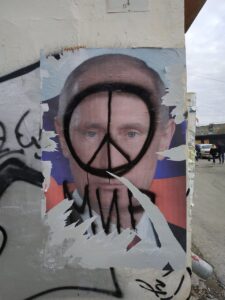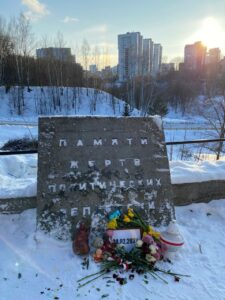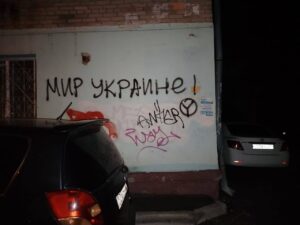Minds of the Movement
An ICNC blog on the people and power of civil resistance
by Maria LakhinaDecember 05, 2024
To the outside observer, some places may seem hopeless and completely lost. It looks like nothing good comes out of them and there should be no faith in their future. I come from such a place, and my organization fights for it.

All images in this post are attributed to the Visual Protest Telegram Channel.
The Youth Democratic Movement Vesna (“Spring” in Russian) was created in 2013 in Saint Petersburg. For the first eight years of its existence, it was a relatively small (nevertheless, ambitious) youth organization with a focus on local and countrywide issues, and with the main goal of introducing youth to political action in the highly atomized and apolitical Russian society.
Back then, Vesna was mostly known for its performances and street actions. As the dictatorship grew stronger and harsher over the late 2010s and during the Covid era, the issues we addressed became more and more pressing and the dangers for all participants increased exponentially. What was previously perceived as harmless performance became a daring act and later evolved into a display of bravery.
By the beginning of 2022, Vesna had several branches in Russian cities, with the biggest one in Saint Petersburg. We were evaluating the long-term goals and strategies that were affected by the lockdown period and societal and governmental changes that followed. The overall tendencies and vibe were suggesting that we should be getting ready for the situation to get worse; however, just how much worse was speculation.
Looking back, our options were obvious and straightforward. However, it was not like that in the moment. After weeks of anxiety and denial, we all woke up to see the awful news on February 24th. Stupor, shock and terror during the first hours gave way to anger and determination. It was a rare occurrence of a clear polarity within Russian society, where one typically sees shades of neutrality and disinterest. We knew that we should react quickly for the protest to gain momentum.
Shifting priorities in the anti-war phase
 As it happened, Vesna became one of the first relatively known Russian opposition organizations to call for anti-war action. The protests on the first day were spontaneous and mostly uncoordinated. There were no strategies and no tactics, just pure emotion. For many people, that was the first time they ever went to such an event—and they did not know what to do next. Luckily, we were able to offer them a plan. It was pretty simple: organize demonstrations on the weekend, and for those eager to do more, spend the week spreading agitation, like putting up stickers, distributing leaflets or creating graffiti to promote anti-war messages and the campaign.
As it happened, Vesna became one of the first relatively known Russian opposition organizations to call for anti-war action. The protests on the first day were spontaneous and mostly uncoordinated. There were no strategies and no tactics, just pure emotion. For many people, that was the first time they ever went to such an event—and they did not know what to do next. Luckily, we were able to offer them a plan. It was pretty simple: organize demonstrations on the weekend, and for those eager to do more, spend the week spreading agitation, like putting up stickers, distributing leaflets or creating graffiti to promote anti-war messages and the campaign.
The first big rally in this campaign happened on February 27th, the third day of the full-scale invasion. For many cities, it was among the biggest street actions in modern history. As expected, it led to many arrests, including a lot of Vesna members.
The cycle was repeated several times, but the number of participants started to decline while police numbers on the street grew. The campaign needed a new approach.
 As these events unfolded, most of the well-known activists had to leave the country due to the threat of criminal prosecution. A lot of people who joined in the beginning grew frustrated at the realization that the protest was more of a marathon than a sprint, leading some to lose interest. Our priorities had to shift from involving as many people as possible, to keeping those who were already involved. That meant that the focus should be shifted from the mass open action to personal, quiet and safer action.
As these events unfolded, most of the well-known activists had to leave the country due to the threat of criminal prosecution. A lot of people who joined in the beginning grew frustrated at the realization that the protest was more of a marathon than a sprint, leading some to lose interest. Our priorities had to shift from involving as many people as possible, to keeping those who were already involved. That meant that the focus should be shifted from the mass open action to personal, quiet and safer action.
The main instrument that we used for this was a “visual protest” Telegram channel and bot. People on the ground carried out various activities, primarily putting out leaflets or stickers, creating graffiti with anti-war messages, or spreading messages in more creative ways—such as writing on banknotes or switching the price tags in shops. They would then document their actions by taking photos and sending them to us through the Telegram bot which anonymizes the sender. We would post the visuals on the special channel with mention of the town or city. This channel remains active to this day, for more than two and a half years now.
This served three goals at the same time. First, it allowed people to take action at lower personal risk, and for their act to still be seen. Secondly, it helped people from the same town to see that others also disagreed with the current situation and were not afraid to say it. And lastly, it helped those who visited the channel to see that tens of thousands (those were the numbers of bot entries in the first months) of people across Russia were actively sharing their anti-war position.
The point of no return
 In May, following our announced sabotage of pro-government rallies on Victory Day, the first alleged members of Vesna were arrested in a criminal case against the organization. This was proof that we had crossed the point of no return. There was no going back to being a local youth group. We had to either grow up, grow stronger and continue, or just give up. We chose the only acceptable option. From that time on, we concentrated on safety. One cannot build a strong movement when one treats its supporters as disposable.
In May, following our announced sabotage of pro-government rallies on Victory Day, the first alleged members of Vesna were arrested in a criminal case against the organization. This was proof that we had crossed the point of no return. There was no going back to being a local youth group. We had to either grow up, grow stronger and continue, or just give up. We chose the only acceptable option. From that time on, we concentrated on safety. One cannot build a strong movement when one treats its supporters as disposable.
On September 21, 2022 began the “partial” mobilization in Russia. For many people, this was a wake-up call or a reminder—and ironically, military mobilization allowed us to mobilize supporters as well. Many people felt that the war had come knocking at their door, and there was a demand for action. We called for another round of street rallies and offered batches of new agitation materials. This earned us lots of attention and, most importantly, new supporters.
In a dictatorship, attention always comes at a price. In this case, the Russian government labeled us an “extremist” organization and put more people under investigation, in jail or on wanted lists. That meant that we had to adjust our methods once again.
Both a buffer and a bridge
 Today, Vesna is somewhat of a dual organization. On the one hand, it focuses on public-oriented action abroad, including advocacy efforts. On the other hand, it is completely non-public regarding any activities within Russia (or lack thereof), as even a slight perceived association with our organization can lead to imprisonment, regardless of an individual’s actual connection to Vesna. We have to maintain secrecy about any activities that may (or may not) be happening inside the country, while reaching out to the outside world to show everyone that Russian anti-war resistance actually exists. We have to be both a buffer and a bridge.
Today, Vesna is somewhat of a dual organization. On the one hand, it focuses on public-oriented action abroad, including advocacy efforts. On the other hand, it is completely non-public regarding any activities within Russia (or lack thereof), as even a slight perceived association with our organization can lead to imprisonment, regardless of an individual’s actual connection to Vesna. We have to maintain secrecy about any activities that may (or may not) be happening inside the country, while reaching out to the outside world to show everyone that Russian anti-war resistance actually exists. We have to be both a buffer and a bridge.
The Kremlin overall is extremely conservative, both in their attempts at ideology and in their technical means. When a lot of us were practically banished from the country, for them it was a solution. They thought that we would lose any connection and understanding of what is going on in Russia—and for many that is true. However, we as an organization strive to make an effort to stay in touch and, thanks to the Internet, we can. And I believe that is the most important part, as we are breaking the artificially created division and isolation between those who stayed and those who left.
Small actions against an angry machine
As of next February, the anti-war campaign will have lasted three years. It is a moral stance against atrocious crimes perpetrated by our state in Ukraine and against crimes that the regime is committing towards their own citizens. It is a declaration of the principles of nonviolence and empathy, which we see as the only way to achieve sustainable democratization. It is our way to assist community building in the country, where the government tries to make everyone feel alone and abandoned. It is also an example of the importance of small actions against a huge and angry machine.
At the beginning we were not ready for such a shift in responsibility and influence—neither we activists personally, nor as an organization. However, the need arose, and we had to learn as we went. It is trial and error, a challenge and a constant race against helplessness and fear. Yet, this struggle is also what gives us (and hopefully, anyone who observes) a lot of hope.

Maria Lakhina
Maria Lakhina is a Russian pro-democracy and anti-war activist. She has participated in Youth Democratic Movement Vesna since 2017, and has been one of its coordinators since 2018. She helped organize nonviolent actions all around Russia in the first months of the full-scale invasion of Ukraine. Now from exile, her movement works on getting the anti-war and anti-Putin voices from inside the country heard.
Read More